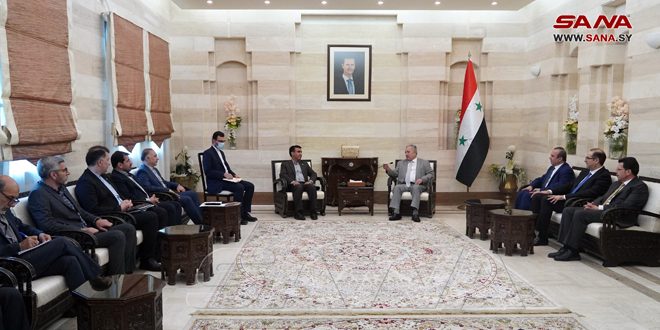Prime Minister Eng. Arnous discusses with the Iranian President’s Assistant the development of bilateral relations
 Prime Minister Eng. Hussein Arnous discussed with the Iranian President’s Assistant and Head of the Environmental Protection Organization Ali Seljuq ways to develop and strengthen bilateral relations, expand them, open new horizons for them, and raise them to the level of strategic and historical relations between the two friendly countries and peoples.
Prime Minister Eng. Hussein Arnous discussed with the Iranian President’s Assistant and Head of the Environmental Protection Organization Ali Seljuq ways to develop and strengthen bilateral relations, expand them, open new horizons for them, and raise them to the level of strategic and historical relations between the two friendly countries and peoples.
The discussions also dealt with the importance of bilateral cooperation to confront the climate changes that the region is exposed to in general, drought, desertification and sandstorms that affect the environment.
Eng. Hussein Arnous said that the American and Turkish occupations in northern and eastern Syria are destroying the environment and soil through arbitrary measures and stealing the Syrian national wealth of oil, wheat and water.
Eng. Hussein Arnous clarified that the Syrian government pays due attention to the implementation of the investment projects signed between the two countries under the joint economic cooperation agreement.
Eng. Hussein Arnous stressed that the Syrian government also pays great attention to all components of sustainable development in its economic, social and environmental dimensions.
For his part, Seljuk affirmed his country’s continued support for Syria in various fields and reiterated its position in support of the territorial integrity and sovereignty of Syria.
Seljuk expressed Iran’s desire to build environmental cooperation to confront the issue of dust storms among the affected countries by developing scientific programs to confront these emerging climatic conditions.
The meeting was attended from the Syrian side by the Minister of Local Administration and Environment, Eng. Hussein Makhlouf, the Secretary-General of the Presidency of the Council of Ministers, Dr. Qais Muhammad Khedr, the Chairman of the Planning and International Cooperation Authority, Dr. FadiAl-Khalil, and from the Iranian side by representatives of the Ministries of Foreign Affairs, Energy, Agriculture, Transportation, the Meteorological Institution, and the Iranian ambassador in Damascus.
Inas Abdulkareem

